#devops engineer certificate
Explore tagged Tumblr posts
Text
DevOps Engineer Certification Program
Advance your career with the DevOps Engineer Certification from SkillUp Online. This 7-month program covers essential tools like Git, Docker, Kubernetes, and Azure DevOps while preparing you for Microsoft certifications (AZ-900, AZ-204, AZ-400). Gain hands-on experience and earn 13 certificates to stand out in the job market.
Learn more at: https://skillup.online/devops-engineer-certification-training-course

#devops certificate#devops certificate course#devops engineer certificate#devops engineer certification#devops engineer certification course#devops engineer
0 notes
Text
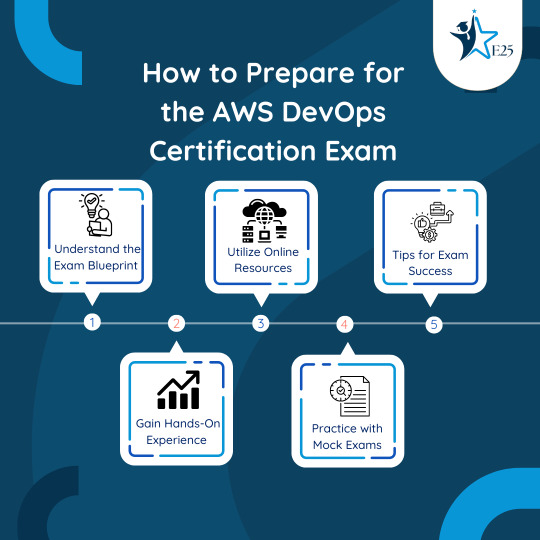
Skills You Learn Through AWS DevOps Certification
CI/CD Implementation
Learn to build and control continuous integration and delivery pipelines using AWS offerings like CodePipeline, CodeBuild, and CodeDeploy.
#Skills You Learn Through AWS DevOps Certification#devops#tech#technology#education#programming#software engineering
0 notes
Text
10 Promising DevOps Job Opportunities in 2025 and Beyond
Table of Contents
Introduction
1.1 What is DevOps?
1.2 The Growing Importance of DevOps in 2025
Why DevOps is a Promising Career Path
2.1 The Evolution of DevOps
2.2 Benefits of a Career in DevOps
Top 10 DevOps Career Opportunities in 2025
3.1 DevOps Engineer
3.2 Cloud Engineer
3.3 Automation Engineer
3.4 Security Engineer
3.5 Site Reliability Engineer (SRE)
3.6 Continuous Integration/Continuous Deployment (CI/CD) Engineer
3.7 Release Manager
3.8 Infrastructure Engineer
3.9 DevOps Consultant
3.10 Product/Platform Manager
Skills Required for DevOps Roles
4.1 Technical Skills
4.2 Soft Skills
Salary Expectations in DevOps Careers for 2025
5.1 Entry-Level Salary Insights
5.2 Experienced Professional Salaries
Future Trends in DevOps Careers
6.1 The Role of AI and Automation in DevOps
6.2 The Impact of Cloud Technologies on DevOps
How to Build a Successful DevOps Career
7.1 Gaining Relevant Certifications
7.2 Hands-on Experience and Projects
Conclusion
Call to Action
1. Introduction
1.1 What is DevOps?
DevOps is a set of practices, principles, and tools designed to improve the collaboration between software development (Dev) and IT operations (Ops). The primary goal of DevOps is to shorten the systems development life cycle and provide high-quality software in a continuous, automated, and efficient manner.
DevOps professionals are responsible for automating processes, managing software deployments, and ensuring system reliability, all while working closely with developers and operations teams to meet business objectives. In 2025, as technology continues to evolve, the demand for DevOps skills is growing rapidly, making it an excellent career path for tech professionals.
1.2 The Growing Importance of DevOps in 2025
In 2025, the global tech industry continues to move toward faster development cycles and greater automation. With businesses needing to deploy updates and features at a much quicker pace than ever before, the role of DevOps professionals becomes increasingly important. Their work allows companies to accelerate the delivery of applications while ensuring that systems remain stable and scalable.
As cloud computing, microservices, containerization, and artificial intelligence continue to influence the tech landscape, the scope of DevOps careers will only expand, making now the perfect time to consider a career in this field.
2. Why DevOps is a Promising Career Path
2.1 The Evolution of DevOps
DevOps has evolved from being a set of best practices into a strategic approach that is now critical to most modern businesses. The rise of agile development methodologies and the push for continuous delivery and integration has driven the need for a DevOps culture. Organizations are now looking for professionals who can bridge the gap between development and IT operations, ensuring both teams collaborate to deliver software seamlessly and efficiently.
2.2 Benefits of a Career in DevOps
A career in DevOps offers numerous advantages. The demand for DevOps professionals is steadily increasing, leading to a wealth of job opportunities. Moreover, DevOps roles typically offer competitive salaries, opportunities for growth, and the chance to work with cutting-edge technologies such as cloud computing, machine learning, and containers. The flexibility and innovation within the field make it an attractive option for those looking to make a mark in the tech industry.
3. Top 10 DevOps Career Opportunities in 2025
3.1 DevOps Engineer
DevOps Engineers are responsible for developing and maintaining the tools and infrastructure required for continuous integration, deployment, and monitoring. They work closely with both developers and IT operations teams to streamline the software delivery process and improve system reliability.
3.2 Cloud Engineer
Cloud Engineers specialize in managing cloud infrastructure. As businesses increasingly move to the cloud, these professionals play a key role in designing and managing scalable cloud architectures, integrating various cloud services, and ensuring cloud-based systems are secure and efficient.
3.3 Automation Engineer
Automation Engineers are responsible for automating manual processes, particularly in testing, deployments, and system monitoring. By using scripts, tools, and software to automate tasks, these engineers improve the speed and reliability of software delivery.
3.4 Security Engineer
DevOps Security Engineers (DevSecOps) are focused on integrating security measures into the DevOps pipeline. They work to ensure that security practices are automated, making security an integral part of the development process and helping to reduce vulnerabilities.
3.5 Site Reliability Engineer (SRE)
Site Reliability Engineers ensure that applications are reliable, scalable, and meet business objectives. They focus on optimizing system performance, managing capacity, and improving uptime by building and maintaining production environments.
3.6 Continuous Integration/Continuous Deployment (CI/CD) Engineer
CI/CD Engineers specialize in creating and maintaining CI/CD pipelines that automate the testing, building, and deployment of software. They are critical to accelerating software releases and ensuring that code is automatically deployed with minimal errors.
3.7 Release Manager
Release Managers are responsible for planning, scheduling, and overseeing software releases. They ensure that all releases follow a structured process and that they are delivered to production environments with minimal disruption.
3.8 Infrastructure Engineer
Infrastructure Engineers design and maintain the systems and networks that support applications. Their role involves ensuring that infrastructure is scalable, reliable, and able to handle increased loads during development cycles.
3.9 DevOps Consultant
DevOps Consultants help organizations implement and optimize DevOps practices. They analyze current systems, recommend solutions, and assist businesses in transforming their software development and operations to a more efficient, automated workflow.
3.10 Product/Platform Manager
Product and Platform Managers in DevOps oversee the development and lifecycle of platforms and tools used by development and operations teams. They work to ensure that all systems are functioning smoothly and meet business needs.
4. Skills Required for DevOps Roles
4.1 Technical Skills
Some of the key technical skills required for DevOps roles include:
Proficiency in scripting languages such as Python, Bash, or Ruby.
Knowledge of continuous integration and deployment tools like Jenkins, GitLab, and Circle.
Familiarity with containerization technologies such as Docker and Kubernetes.
Understanding of cloud platforms like AWS, Azure, or Google Cloud.
Knowledge of monitoring tools like Prometheus, Grafana, and New Relic.
4.2 Soft Skills
In addition to technical expertise, DevOps professionals should possess strong communication, collaboration, and problem-solving skills. Since DevOps requires working across teams and departments, the ability to communicate technical information clearly and work well with others is essential.
5. Salary Expectations in DevOps Careers for 2025
5.1 Entry-Level Salary Insights
In 2025, entry-level DevOps roles typically offer salaries ranging from $60,000 to $90,000, depending on the role and location. As organizations increasingly adopt DevOps practices, the demand for entry-level professionals with relevant certifications and experience is high.
5.2 Experienced Professional Salaries
For experienced DevOps professionals, salaries can range from $100,000 to $150,000 or more, with senior roles and specialized positions, such as Cloud Engineers or Security Engineers, offering even higher compensation.
6. Future Trends in DevOps Careers
6.1 The Role of AI and Automation in DevOps
As AI and automation technologies continue to evolve, they will play a significant role in shaping the future of DevOps. AI can assist in areas such as predictive monitoring, failure detection, and automated decision-making, leading to even more efficient and error-free DevOps processes.
6.2 The Impact of Cloud Technologies on DevOps
Cloud technologies are integral to DevOps, and as cloud platforms evolve, so too will the role of DevOps professionals. Expect to see increased adoption of hybrid cloud architectures, serverless computing, and multi-cloud strategies in the coming years.
7. How to Build a Successful DevOps Career
7.1 Gaining Relevant Certifications
Certifications in tools and technologies such as AWS, Azure, Kubernetes, and Docker can help boost your credentials and demonstrate expertise in DevOps practices.
7.2 Hands-on Experience and Projects
Building real-world experience through internships, personal projects, or contributing to open-source DevOps projects is one of the best ways to gain credibility and develop your skills.
8. Conclusion
DevOps careers are more promising than ever in 2025. With the continued evolution of cloud computing, AI, and automation, the demand for skilled DevOps professionals will only grow. Whether you are just starting or looking to advance your career, the opportunities are abundant for those who have the right skills and mindset.
9. Call to Action
If you’re ready to pursue a rewarding career in DevOps, explore more resources, tools, and courses to help you get started at ScholarAcad. Enhance your skills, learn the latest trends, and join the growing community of DevOps professionals today!
How to Build a Successful DevOps Career
Top Certifications for DevOps Professionals
DevOps Tools You Need to Know in 2025
The Best Cloud Platforms for DevOps Engineers
Career Growth in DevOps
AWS DevOps Certification
Azure DevOps Solutions
Docker Official Site
Kubernetes and DevOps
GitLab DevOps Guide
0 notes
Text
#azure data engineer#azure course#azure training#azure online training#azure certification#microsoft azure certification#azure certification path#azure fundamentals#azure devops certification#azure cloud certification#microsoft azure fundamentals
1 note
·
View note
Text
We at DevLabs are more than just another IT company. We are the catalyst that boosts your business. With a vision to make a change in the existing IT standards, DevLabs Alliance has been dedicated to excelling in the IT domain for the last five years.Headquartered in India, DevLabs Alliance has been able to expand its services worldwide in countries like America.But what we are today was not built overnight. It took a whole cycle of continuous development, learning from mistakes, and slowly bringing a revolution in the IT landscape.
#testing#devops#certifications#softwaredevelopment#technology#web development#automation#dla#devops engineer
0 notes
Text
Invest your future by pursuing rich varieties of Certification Courses in Azure in Mumbai, DevOps Engineer Certification in Mumbai, and Professional Courses in Azure in Mumbai.
0 notes
Text
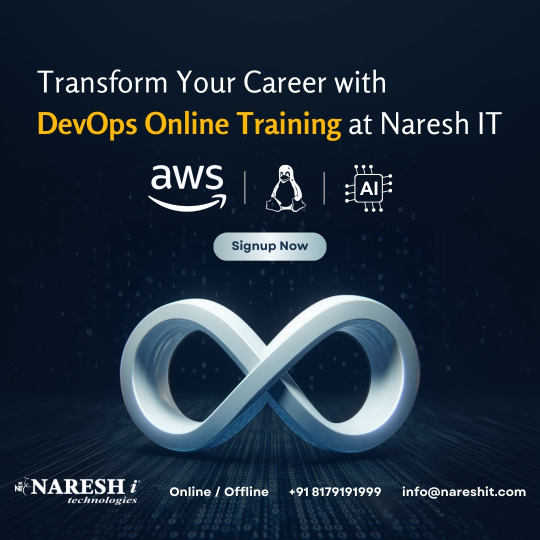
Boost your career with hands-on DevOps Online Training. Learn from industry experts and gain practical skills to become a DevOps pro. Enroll in our DevOps Online Training to get certified and accelerate your career!
#devops#DevOpsOnlineTraining#LearnDevOps#devops certification#DevOps Courses#DevOps Career#online training#devops engineer#devops tools#devops automation#DevOps Cloud#DevOps Best Practices#DevOps Hands-on Training#DevOps for Beginners
0 notes
Text
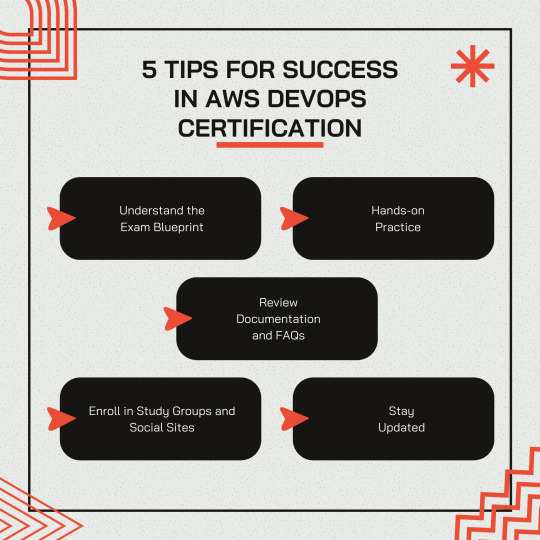
Unlock the power of DevOps in the cloud with our comprehensive AWS DevOps Engineer Certification training course. Designed for professionals seeking to validate their expertise in DevOps practices on the Amazon Web Services (AWS) platform, this course provides a structured learning pathway to help you excel in your career.
0 notes
Text
The benefits of earning a DevOps engineer certification

In the ever-evolving landscape of IT and software development, the role of a DevOps engineer has become increasingly crucial. DevOps is a set of practices that combines software development (Dev) and IT operations (Ops) to shorten the systems development life cycle and provide continuous delivery of high-quality software. As businesses strive to deliver products and services at an ever-increasing pace, the demand for skilled DevOps engineers is at an all-time high.
What is DevOps?
DevOps is a culture, movement, or practice that emphasizes the collaboration and communication of both software developers and other information-technology (IT) professionals while automating the process of software delivery and infrastructure changes. It aims at establishing a culture and environment where building, testing, and releasing software can happen rapidly, frequently, and more reliably.
Benefits of DevOps Engineer Certification
Career Advancement: Earning a DevOps engineer certification can significantly enhance your career prospects. Employers are actively seeking professionals with DevOps skills, and holding a certification demonstrates your expertise and commitment to the field.
Increased Job Opportunities: The demand for DevOps engineers is expected to continue to grow as organizations adopt DevOps practices. Certification can open doors to a wide range of job opportunities in various industries.
Higher Salary: DevOps engineers are among the highest-paid professionals in the IT industry. Holding a certification can lead to higher salaries and better job offers.
Enhanced Skills: Certification programs provide in-depth training on DevOps practices, tools, and technologies, allowing you to acquire new skills and stay updated with the latest trends in the field.
Recognition and Credibility: Certification from a reputable organization adds credibility to your resume and validates your expertise in DevOps practices.
Networking Opportunities: Certification programs often provide access to a community of DevOps professionals, allowing you to network and learn from peers and experts in the field.
Continuous Learning: DevOps is a rapidly evolving field, and certification programs require you to stay updated with the latest developments, ensuring that your skills remain relevant.
Global Recognition: DevOps certifications are recognized globally, allowing you to pursue career opportunities around the world.
How to Get DevOps Engineer Certified
Choose the Right Certification: There are several DevOps certifications available, including Certified DevOps Engineer, AWS Certified DevOps Engineer, and Microsoft Certified: DevOps Engineer Expert. Choose a certification that aligns with your career goals and interests.
Prepare for the Exam: Study the exam syllabus and topics thoroughly. Consider enrolling in a training program or taking online courses to prepare for the exam.
Take the Exam: Schedule and take the certification exam at a certified testing center. Be prepared to demonstrate your knowledge and skills in DevOps practices.
Maintain Your Certification: Some certifications require you to renew your certification periodically by taking additional exams or completing continuing education requirements.
Conclusion
Earning a DevOps engineer certification can be a valuable investment in your career. It can open up new opportunities, increase your earning potential, and enhance your skills and expertise in DevOps practices. Whether you are a seasoned IT professional or just starting in the field, a DevOps certification can help you stand out in a competitive job market and advance your career in IT and software development.
Source:- https://skillup.online/devops-engineer-certification-training-course/
0 notes
Text
The GSDC governs the Certified DevOps Engineer Certification, which emphasizes the practical implementation of the DevOps framework through various tools. A DevOps Engineer Certification focuses on continuous development and deployment, software development operations, continuous integration, configuration management automation, and learning multiple tools, including Git, Docker, Jenkins, Nagios, Puppet, Ansible, and Kubernetes. Therefore, the cost of obtaining this DevOps Certification is entirely justified. Understanding DevOps starts with a culture shift and progresses to include knowledge of duties and various roles, team structures cross-functional, and the Importance of automation for effective DevOps deployment.
0 notes
Text

It is a dynamic headline designed to inspire IT professionals to take their careers to the next level with the DevOps Practitioner Certification. This certification is not just a credential; it's a significant step in mastering the multifaceted world of DevOps. As a DevOps Practitioner, individuals gain comprehensive knowledge and practical skills in automation, coding, scripting, collaboration, and communication within the IT operational and development environment.
#devops practitioner#devops practitioner certification#certified devops practitioner#devops certification#devops certificate#devops engineer certification
0 notes
Text
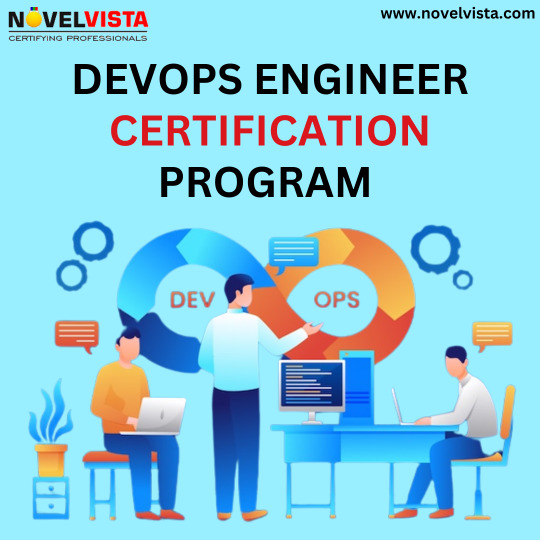
Embark on a transformative journey with our DevOps Engineer Certification Program, designed for tech enthusiasts eager to bridge the gap between development and operations. This comprehensive certification delves deep into the core principles of DevOps, covering essential tools, methodologies, and best practices.
#devops certification#devops certificate#devops engineer certification#devops engineer certificate program
0 notes
Text
🚀 Boost Your Career with the Best DevOps Certifications! 🚀
Ready to take your tech career to the next level? Discover the top DevOps certifications that will equip you with the skills and credentials to stand out in the competitive world of IT. From mastering automation to enhancing your CI/CD pipeline, these certifications are your ticket to becoming a sought-after DevOps professional. Don't miss out on the chance to upskill and transform your career today!
0 notes
Text
How to Advance Your Career with AWS Certifications
In the fast-paced world of cloud computing, Amazon Web Services (AWS) has established itself as a leader in providing scalable, reliable, and cost-effective cloud solutions. As organizations increasingly migrate their workloads to the cloud, the demand for skilled AWS professionals has surged. If you're looking to advance your career in the IT industry, AWS certifications can be your ticket to success. We'll explore how AWS certifications can propel your career forward and provide a step-by-step guide to achieving them.
The Power of AWS Certifications
AWS certifications are widely recognized in the IT industry and are considered a valuable asset for both newcomers and seasoned professionals. Here are some key reasons why AWS certifications can supercharge your career:
1. Industry Recognition
AWS is a trusted name in cloud computing, and their certifications are well-respected by employers worldwide. Holding an AWS certification demonstrates your expertise and commitment to staying current in a rapidly evolving field.
2. Career Advancement
AWS certifications can open doors to new job opportunities and promotions. Many organizations prefer to hire certified professionals because they are seen as more capable and knowledgeable in AWS technologies.
3. Increased Earning Potential
Certified AWS professionals often command higher salaries than their non-certified counterparts. According to a survey by Global Knowledge, AWS-certified individuals earn an average salary that is significantly above the industry average.
4. Skill Validation
Obtaining an AWS certification validates your skills and knowledge in specific AWS services and technologies. It serves as concrete evidence of your expertise in the eyes of potential employers.
Choosing the Right AWS Certification
AWS offers a wide range of certifications, catering to various roles and skill levels. Before you embark on your certification journey, it's essential to choose the one that aligns with your career goals and current experience. Here are a few popular AWS certifications:
1. AWS Certified Cloud Practitioner
Designed for individuals with little or no cloud experience, this entry-level certification provides a broad overview of AWS services, cloud concepts, and basic architectural best practices.
2. AWS Certified Solutions Architect
This certification is ideal for those interested in designing distributed systems on AWS. It covers topics like architectural best practices, security, and scalability.
3. AWS Certified SysOps Administrator
Focused on system operations and management, this certification is suitable for individuals responsible for deploying, managing, and operating systems on AWS.
4. AWS Certified DevOps Engineer
For those interested in automation, this certification validates skills related to continuous delivery, automation, and managing infrastructure as code.
5. AWS Certified Security - Specialty
For security professionals, this certification focuses on securing AWS workloads and implementing advanced security measures.
Steps to AWS Certification Success
Now that you've decided on the right certification, here are the steps to help you achieve your goal:
1. Set Clear Goals
Define your career goals and how AWS certifications align with them. Having a clear vision will keep you motivated throughout your certification journey.
2. Choose Relevant Training Resources
AWS provides extensive documentation and training resources, including online courses, practice exams, and official study guides. Consider enrolling in AWS Certified training courses, which are designed to help you prepare for the exams.
3. Hands-On Experience
Practice is key to mastering AWS. Create your AWS account and experiment with the services covered in your chosen certification. Hands-on experience will deepen your understanding and boost your confidence.
4. Study and Prepare
Devote time to study and review the certification's objectives. Use study guides, practice exams, and community forums to reinforce your knowledge.
5. Take Practice Exams
Practice exams are invaluable for gauging your readiness. They help you identify areas where you need to improve and build your test-taking skills.
6. Schedule and Take the Exam
Once you feel confident in your knowledge, schedule your exam. AWS offers both online and in-person testing options to accommodate your preferences.
7. Stay Informed
AWS constantly updates its services and certifications. Stay informed about changes and consider pursuing additional certifications to continue growing in your career.
Conclusion
AWS certifications have become a gold standard in the IT industry, and they offer an excellent opportunity to advance your career. Whether you're starting from scratch or looking to level up your skills, there's a certification tailored to your needs. Remember that certification is a journey, not a destination. Keep learning, stay updated, and embrace the dynamic world of AWS to unlock the full potential of your cloud computing career. With dedication and the right certifications, you can be on your way to a brighter and more rewarding future in the world of cloud computing.
#AWS Certifications#AWS Training#Cloud Computing Certifications#Amazon Web Services#AWS Solutions Architect#AWS Certified Developer#AWS Certified SysOps Administrator#AWS Certified Cloud Practitioner#AWS Certified DevOps Engineer#AWS Specialty Certifications#Cloud Security Certifications#Cloud Networking Certifications
0 notes
Video
youtube
AZ 900 - Azure fundamentals exam questions| Latest series |Part 11
#youtube#az900#azure#azuredeveloper#azure devops#azure data engineer training#azure fundamentals#it certifications online#it certification courses#cloud#cloud certification#cloud courses
0 notes
Text
AWS DevOps Engineer Certification Training: A Comprehensive Guide to Mastering DevOps
Introduction
In today's fast-paced digital landscape, the integration of development and operations (DevOps) practices has become paramount for organizations striving to achieve agility, efficiency, and reliability in their software development lifecycle. Among the various cloud platforms available, Amazon Web Services (AWS) stands out as a leader in providing robust DevOps solutions. If you're looking to advance your career in DevOps and validate your skills, pursuing an AWS DevOps Engineer certification training course could be your next step towards success.
Understanding AWS DevOps Certification
The AWS DevOps Engineer certification is designed for professionals who possess advanced technical skills and experience in provisioning, operating, and managing distributed application systems on the AWS platform. This certification validates your expertise in implementing DevOps practices and tools in the AWS environment, ensuring seamless integration between development and operations teams.
Why Pursue DevOps Certification?
Career Advancement Opportunities:
Earning an AWS DevOps certification opens doors to a wide range of career opportunities. DevOps engineers are in high demand as organizations increasingly prioritize agility, automation, and collaboration in their software development processes. With this certification, you demonstrate your proficiency in leveraging AWS services to streamline development workflows, optimize infrastructure, and enhance deployment practices, making you a valuable asset to any organization.
Mastery of DevOps Tools and Practices:
The AWS DevOps Engineer certification training equips you with in-depth knowledge of various DevOps tools and practices essential for modern software development. From continuous integration and continuous deployment (CI/CD) pipelines to infrastructure as code (IaC) and monitoring solutions, you'll gain hands-on experience with industry-leading tools like AWS CodePipeline, AWS CodeDeploy, AWS CloudFormation, and AWS CloudWatch. By mastering these tools, you'll be well-prepared to architect scalable, reliable, and automated DevOps solutions on AWS.
Validation of Skills:
Certification serves as tangible proof of your expertise and commitment to excellence in DevOps. By passing the rigorous AWS DevOps Engineer exam, you demonstrate your proficiency in designing, implementing, and managing DevOps practices on AWS. This validation not only boosts your confidence but also enhances your credibility in the eyes of employers, clients, and peers, opening up new avenues for career growth and advancement.
Overview of AWS DevOps Engineer Certification Training Course
Core Concepts Covered:
The AWS DevOps Engineer certification training course encompasses a comprehensive curriculum designed to cover the core concepts and skills required for success in DevOps roles. Key topics include:
AWS services for DevOps: Explore a wide range of AWS services, including compute, storage, networking, databases, and monitoring, and learn how to leverage them to build resilient and scalable DevOps solutions.
Continuous Integration and Continuous Deployment (CI/CD): Understand the principles of CI/CD and learn how to implement automated build, test, and deployment pipelines using AWS CodePipeline, AWS CodeBuild, and AWS CodeDeploy.
Infrastructure as Code (IaC): Discover the benefits of managing infrastructure as code and master tools like AWS CloudFormation to provision and manage AWS resources using declarative templates.
Monitoring and Logging: Learn how to monitor the health and performance of your AWS infrastructure and applications using AWS CloudWatch, AWS X-Ray, and other monitoring tools.
Security and Compliance: Explore best practices for securing your AWS environment and ensuring compliance with industry standards and regulations, including IAM policies, encryption, and auditing.
Hands-on Labs and Projects:
The certification training course includes hands-on labs, exercises, and real-world projects designed to reinforce your learning and practical skills. Through guided exercises and projects, you'll have the opportunity to apply theoretical concepts to real-world scenarios, gaining valuable experience in designing, implementing, and troubleshooting DevOps solutions on AWS.
Expert Guidance and Support:
Throughout the training course, you'll receive expert guidance and support from certified AWS instructors with extensive industry experience. Whether you have questions about course material, need assistance with lab exercises, or require clarification on certification exam topics, our instructors are here to help you succeed.
Tips for Success in AWS DevOps Certification
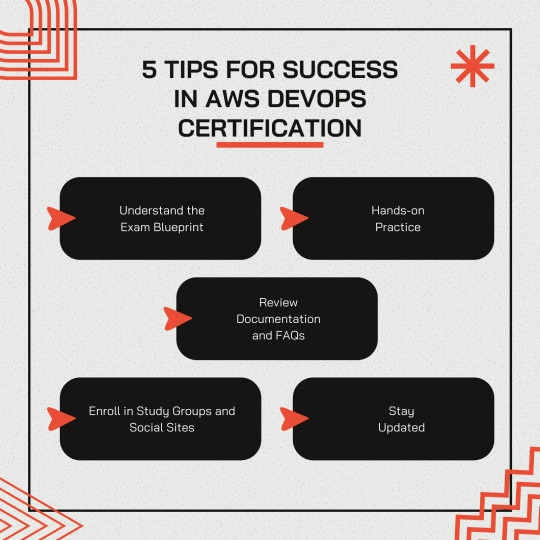
1. Understand the Exam Blueprint:
Familiarize yourself with the AWS DevOps Engineer certification exam blueprint, which outlines the topics and skills covered in the exam. Focus your study efforts on mastering these key areas to ensure you're well-prepared for the exam.
2. Hands-on Practice:
Practice, practice, practice! Hands-on experience is essential for success in DevOps roles and certification exams. Take advantage of the lab exercises and projects included in the training course to gain practical experience with AWS services and tools.
3. Review Documentation and FAQs:
AWS offers comprehensive documentation and FAQs for all its services. Make use of these resources to deepen your understanding of AWS services, explore best practices, and clarify any concepts or topics you find challenging.
4. Enroll in Study Groups and Social Sites:
Join discussion boards, study groups, and online communities devoted to obtaining an AWS DevOps certification to become involved with the AWS community. Collaborating with peers, exchanging ideas, and sharing knowledge can all improve your learning process and offer insightful new viewpoints.
5. Stay Updated:
The field of DevOps is constantly evolving, with new tools, practices, and technologies emerging regularly. Stay updated with the latest trends, developments, and updates in the DevOps ecosystem to ensure your skills remain relevant and in-demand.
Conclusion:
The AWS DevOps Engineer certification training course offers a structured pathway for professionals looking to advance their careers in DevOps. By mastering key concepts, tools, and practices on the AWS platform, you'll not only validate your skills but also gain the expertise needed to architect, deploy, and manage scalable and reliable DevOps solutions in the cloud. Whether you're a seasoned DevOps practitioner or a newcomer to the field, investing in AWS DevOps certification can be a transformative step towards achieving your career goals and unlocking new opportunities in the dynamic world of cloud computing.
0 notes